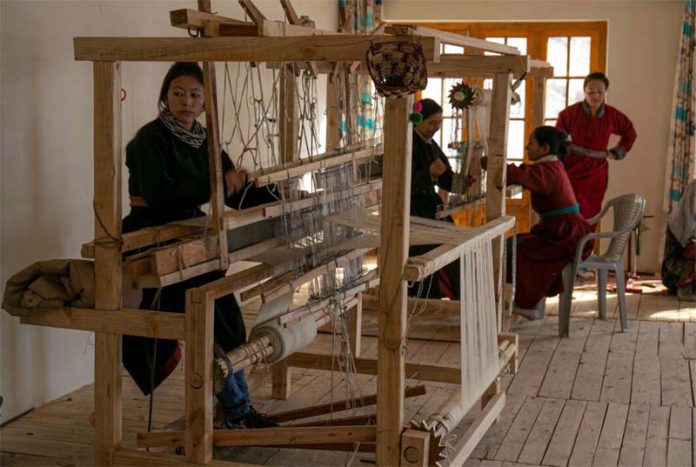Suhail Bhat
LEH, Aug 18: Two women are redefining the traditional Pashmina trade in Leh with a fresh approach rooted in the region’s rich cultural history.
The all-women startup, Lena Ladakh Pashmina, is making waves by incorporating subtle designs inspired by Ladakh’s heritage while reclaiming the Pashmina Industry, which has long been dominated by Kashmir.
Founded in 2016 by Sonam Angmo and Stanzin Minglak, Lena Ladakh Pashmina stands out not only for its focus on traditional techniques but also for its commitment to empowering local women artisans. The venture involves over 33 artisans, who are engaged in every step of production-from spinning and dyeing to weaving and finishing. The startup identifies itself as a “slow textile label,” dedicated to maintaining sustainability while celebrating Ladakh’s unique cultural identity.
At the Lena Ladakh Pashmina studio on the outskirts of Leh, the atmosphere is one of intense craftsmanship. Thirteen women artisans are hard at work, each absorbed in different stages of weaving Pashmina. Some are operating looms, while others are handling warping and drafting. Sonam Angmo, 35, is at the heart of this lively scene, personally overseeing the dyeing process using natural dyes derived from local plants and minerals. “Pashmina naturally comes in white, beige, and gray, but we create other colors using natural, handmade dyes,” explains Angmo.
The production process is intricate and time-consuming. “We use fly shuttle looms to weave the fabric, starting with warping and drafting the yarns. The weaving process follows, and finally, the fabric undergoes finishing and drying.” says Angmo.
The startup has been instrumental in reviving traditional skills that were on the verge of disappearing while providing a dignified and sustainable livelihood for the women artisans, who have kept these techniques alive for generations. “There are about 33 women on our team. Thirteen work at the studio every day, while the rest work from home, focusing on tasks like spinning and twisting,” Angmo adds.
The inspiration behind “Lena Ladakh Pashmina” came while both founders were nearly completing their master’s degrees-Angmo in biotechnology and Minglak, who was finishing her thesis on the migration patterns of the Changpa nomads. Their field visits to Changthang, the high-altitude plateau where pashmina goats are reared, were crucial in shaping their vision. They spent more than a year researching the local Pashmina economy, studying the artisans’ skills, and understanding the fabric’s economic potential before starting their venture.
Minglak notes that the Ladakhi Pashmina they produce is entirely handcrafted, hand-spun, handwoven, and naturally dyed, retaining the essence of Ladakh. “Our approach is completely Ladakhi, whether it is spinning with the willow spindle, weaving on fly shuttle looms, or using natural dyes. Everything we do is sustainable and deeply rooted in our cultural heritage,” she emphasizes.
However, the journey has not been without challenges. Educating clients about the distinct characteristics of Ladakhi Pashmina has been difficult. “Many clients come with preconceived notions that Pashmina must be lightweight and able to pass through a wedding ring, but our understanding of Pashmina purity is different,” says Minglak. To bridge this gap, she says, they have organized workshops on natural dyeing and weaving, attracting guests from around the world. “These workshops offer participants a hands-on experience of working with pashmina and a glimpse into the fabric’s history and significance,” she says.
Unlike the lightweight pashmina typically associated with Kashmir, which is often reserved for special occasions, they encourage clients to use their products daily. “We believe Ladakhi Pashmina is like wine-it only gets better with age,” Minglak says with a smile.


